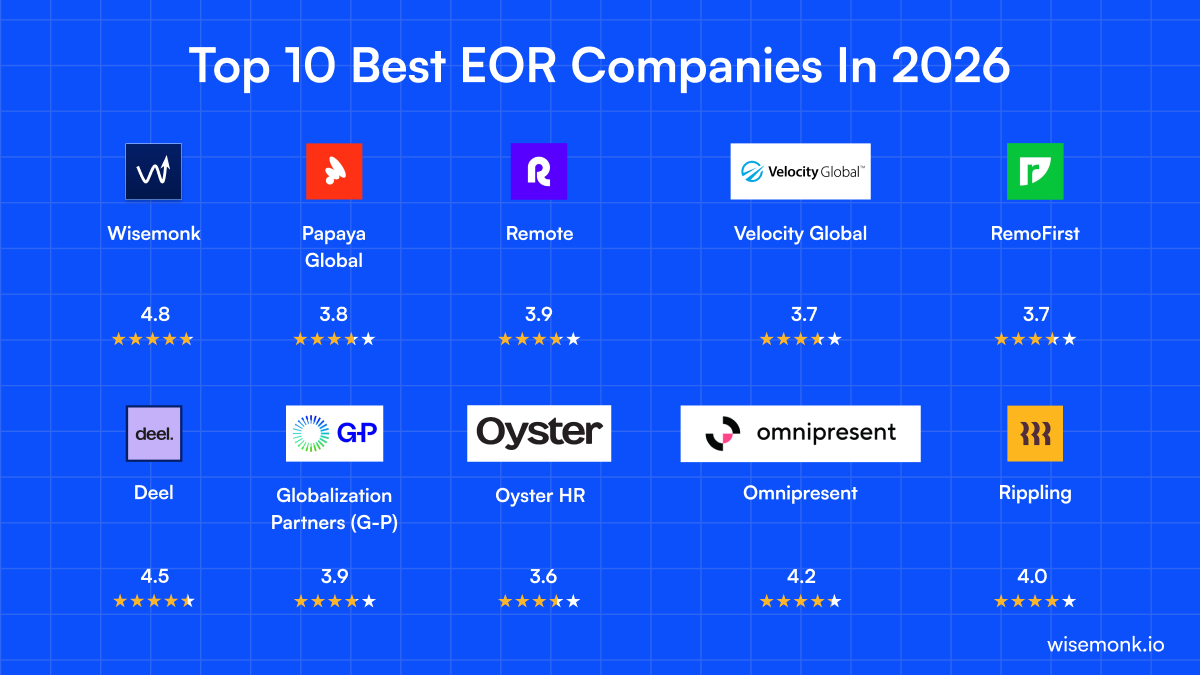Aiming to quickly build your team amid Ireland’s complex legal framework? Partnering with an employer of record in Ireland lets you hire fast, stay fully compliant with Irish employment law, and avoid setting up a local legal entity. Since Brexit, Ireland’s position as the only English-speaking EU member makes it the perfect gateway for businesses seeking seamless access to the European market. From payroll to benefits and statutory requirements, EOR services handle the legal complexities so you can focus on growing your business. Based on our experience working with global companies, using an EOR is the fastest, safest way to enter the Irish market.
What are the essential Irish employment laws you need to know?[toc=Irish Employment Law Framework]
Ireland’s strong legal system sets clear rules for hiring, managing, and protecting employees. In our experience supporting global businesses, understanding core Irish employment laws is the foundation for compliance and employee trust.
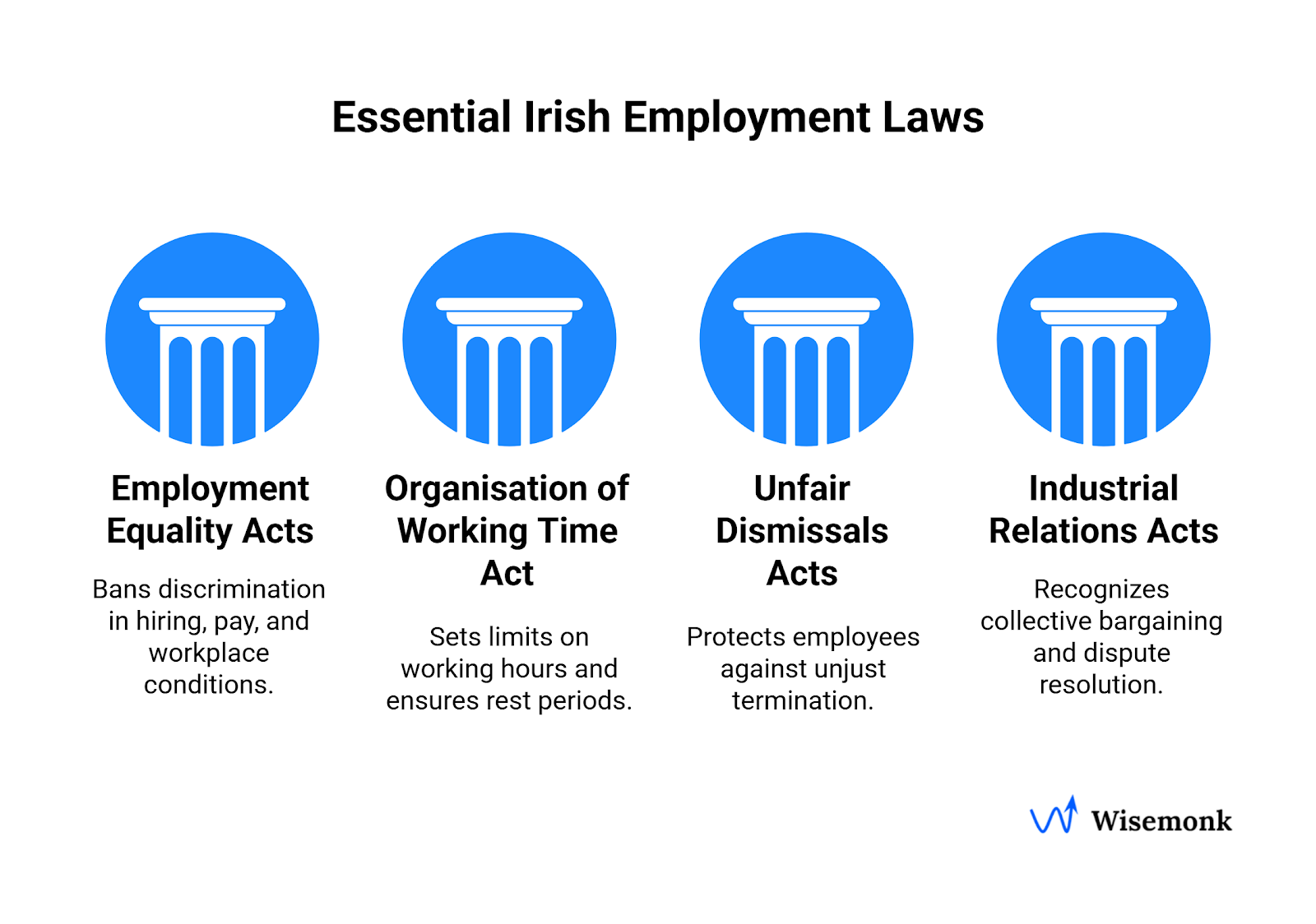
- Employment Equality Acts: These laws ban discrimination in hiring, pay, training, promotion, and workplace conditions. All workers are protected against unfair treatment based on age, gender, race, disability, and more.
- Organization of Working Time Act: Sets limits on working hours (maximum 48 hours per week), rest periods, break times, and minimum annual leave. This ensures a healthy work-life balance and fair overtime for all employees.
- Unfair Dismissals Act: Safeguard employees against unjust termination. Dismissals must have substantial grounds, such as conduct or redundancy, and follow fair procedures. Employees have the right to challenge dismissals and seek remedies.
- Industrial Relations Acts: Recognize voluntary collective bargaining, support employee involvement, and establish frameworks for resolving disputes between employers and the workforce. Minimum standards like pay, hours, and holidays are set by law, with additional terms often agreed through unions or collective agreements.
Proper compliance with these laws means your business is equipped to build fair contracts, manage legal risks, and foster positive relations with Irish employees, key for long-term success in Ireland’s dynamic market.
What are the main benefits of using an Employer of Record in Ireland?[toc=Benefits of Using EOR]
Thinking about why EOR services are the go-to solution for Irish expansion? From our experience guiding global businesses, here’s what stands out.
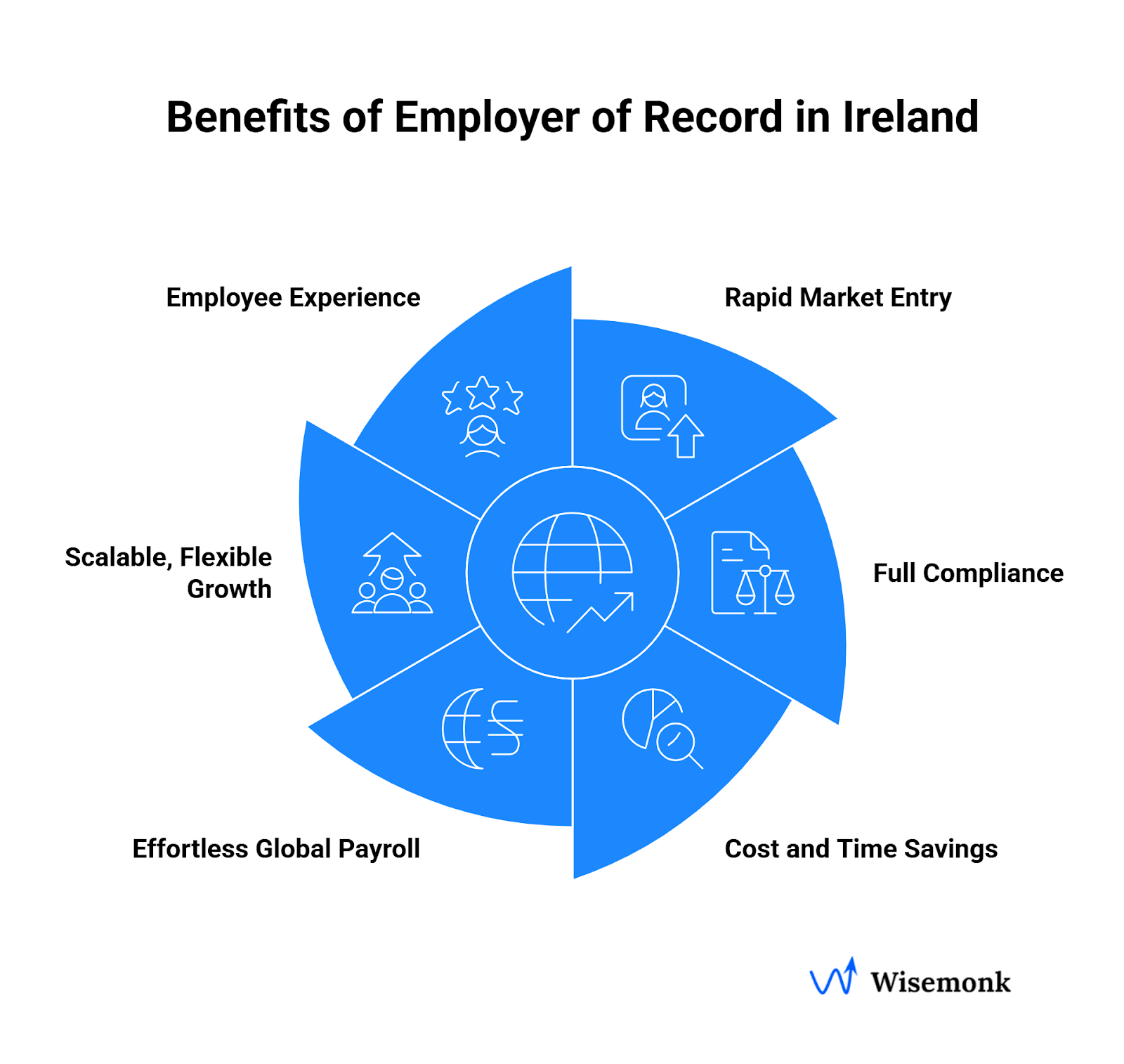
- Rapid Market Entry: EOR services let you hire Irish employees in just days or weeks, skipping the lengthy process of creating a local entity.
- Full Compliance: Your EOR partner handles all employment contracts, payroll, and statutory benefits in line with local Irish labor laws, streamlining legal obligations and reducing risks of fines or misclassification.
- Cost and Time Savings: You avoid high setup costs for a legal entity and reduce the administrative burden of HR, tax filings, and ongoing compliance tasks.
- Effortless Global Payroll: EOR services process salaries, taxes, and statutory deductions for your Irish employees, ensuring payments are accurate and on time every month.
- Scalable, Flexible Growth: Whether you’re testing the Irish market or planning to scale, an EOR lets you grow your team up or down quickly, without long-term commitments or regulatory hassle.
- Employee Experience: Irish workers receive all mandatory benefits and entitlements, building trust and compliance from day one.
Having worked with a range of international companies, we can say an EOR is the simplest way to expand in Ireland, delivering flexibility, compliance, and peace of mind so you can focus on building your team and business.
How does payroll and tax compliance work in Ireland?[toc=Payroll & Tax Compliance]
Managing payroll compliance is a top priority for companies hiring in Ireland. A clear grasp of Ireland’s payroll and tax system is essential for smooth expansion and satisfied Irish employees.
- Income Tax: Irish income is taxed at two main income tax rates: 20% and 40%, depending on income level. All income earned by Irish employees is subject to these rates, with specific tax bands for individuals and couples.
- PRSI Contributions: Both employees and employers must contribute to Pay Related Social Insurance (PRSI), which funds state benefits like pensions and illness payments. For most employed persons, the employer PRSI rate is currently 11.15%, and the employee rate is 4.1%, with rates rising slightly from October 2025.
- Universal Social Charge (USC): USC is a separate tax paid on gross income above €13,000 per year, starting at 0.5% and rising to 8% for higher incomes. All payroll calculations must include USC as a mandatory deduction.
- Monthly and Annual Filings: Employers are responsible for monthly returns and payments of PAYE (Pay As You Earn), PRSI, and USC to Ireland’s Revenue Commissioners. An annual summary is also required by 31 October each year, with extensions if filed online.
Keeping up with these requirements ensures ongoing compliance, reduces the risk of penalties, and helps build trust with your Irish workforce. An EOR partner in Ireland expertly manages these payroll obligations, so you can focus on building your team with confidence.
What benefits and entitlements do employees in Ireland receive?[toc=Employee Benefits & Entitlements]
Employers in Ireland must follow Irish employment law, offering statutory employee benefits to every Irish worker and clearly stating all entitlements in compliant employment contracts. Here’s what’s required:
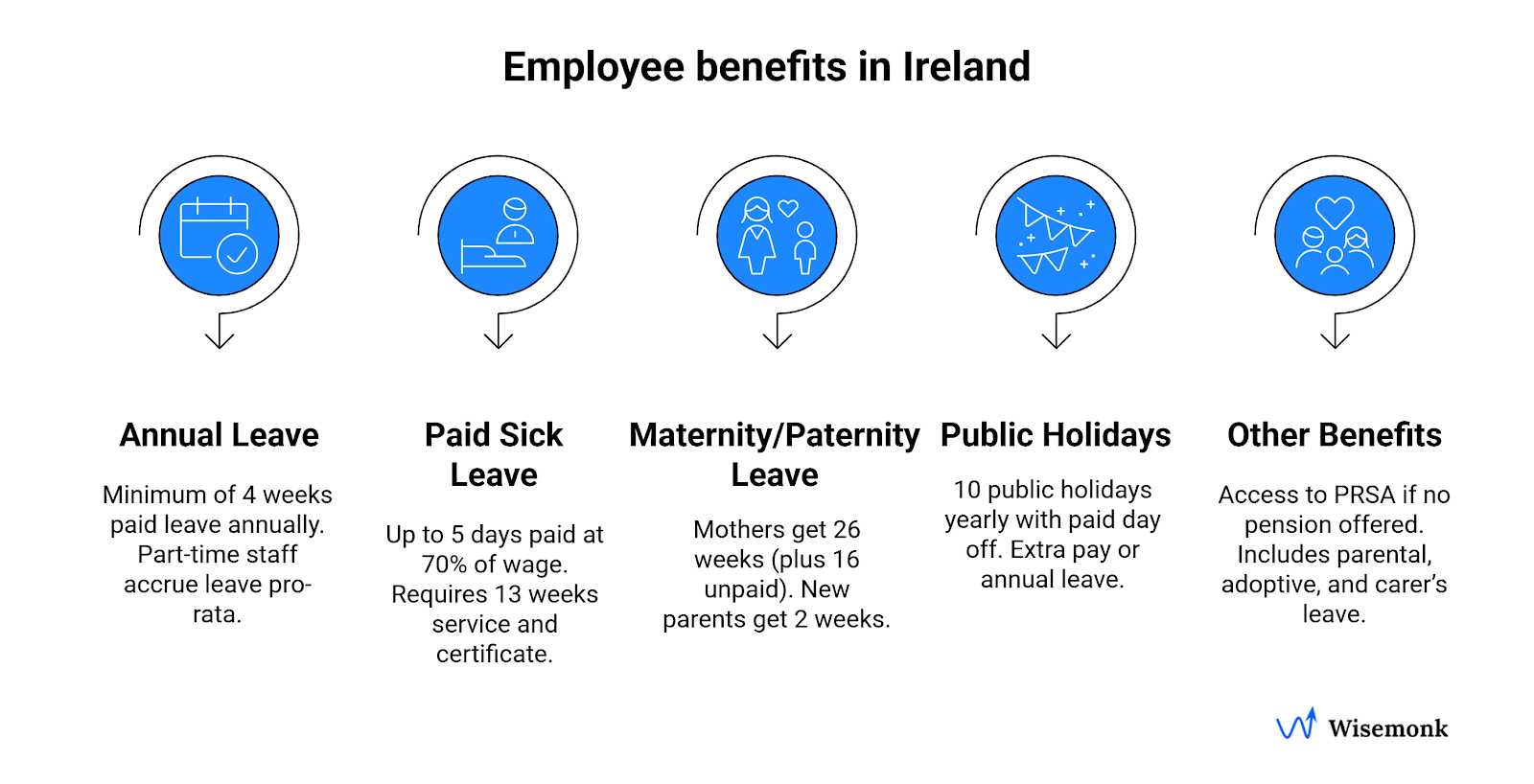
- Annual Leave: At least 4 weeks (20 days) paid annual leave per year; part-time employees accrue leave pro rata. This aligns with local labour laws and should always be detailed in contracts.
- Paid Sick Leave: Employees get 5 days of statutory sick pay per year, at 70% of normal salary (max €110/day), after 13 weeks of service and with medical certification.
- Maternity and Paternity Leave: Mothers receive 26 weeks of maternity leave; new parents get 2 weeks of paternity leave within the first 6 months after birth or adoption, all protected by Irish labor laws.
- Public Holidays: There are 10 statutory public holidays. Employees are paid for holidays or receive equivalent leave or pay if required to work.
- Personal Retirement Savings Account (PRSA): If no occupational pension is offered, employers must provide access to a PRSA to meet Irish government retirement savings requirements.
These mandatory benefits ensure compliance with Irish labor laws, support employee retention, and are central to correct benefits administration for any employer of record in Ireland.
Clear, transparent employee benefits are key to successful hiring and retention in the Irish market. Staying current on statutory minimums protects both you and your workforce.
What’s involved in hiring and onboarding employees in Ireland?[toc=Hiring & Onboarding Process]
Starting to build your team in Ireland? Here’s how the hiring and onboarding process works with an employer of record, making it quick, compliant, and hassle-free.
- Required Documentation: Every new employee needs a Personal Public Service (PPS) number, which is essential for payroll and tax. Applying for a PPS number requires proof of identity (passport or national ID), proof of address, and a signed job offer or contract from the employer.
- Background Verification: Employers typically verify a candidate’s identity, employment history, education, and references. For certain roles, criminal background checks, credit checks, and medical assessments may be needed, but all checks require candidate consent and compliance with Irish data protection laws.
- Compliant Employment Contracts: By law, employees must receive a written contract outlining role, responsibilities, salary, benefits, notice period, and working hours within five days of starting. Contracts should include probation periods (commonly 3–6 months), details around fixed-term or permanent status, and all statutory entitlements.
- Smooth Onboarding: An EOR guides employees through integration, providing orientation, access to benefits, and essential HR support. New hires are entered into statutory payroll and benefits schemes from day one, ensuring compliance and timely payments.
A streamlined onboarding process in Ireland helps new hires settle in confidently, so you can focus on scaling while compliance, documentation, and HR admin are fully handled.
How do you successfully manage a workforce in Ireland?[toc=Workforce Management]
Curious about collaborating with Irish employees or creating a positive team culture within the framework of Irish employment law? From our experience supporting global companies and providing eor services in Ireland, the essentials are clear and straightforward:
- Work Culture: Irish workplaces blend professionalism with warmth, prioritizing flexibility and employee well-being while respecting local labour laws and statutory benefits.
- Communication: Teams prefer open, informal, and respectful dialogue. Using first names, humor, and regular feedback fosters trust and strong connections, key to managing the Irish workforce effectively.
- Performance Management: Clear expectations and frequent feedback are important. While some companies use annual employment reviews, many favor ongoing coaching and transparent performance discussions aligned with Irish labor regulations.
- Professional Development: Continuous learning is a priority. Irish employees are encouraged to join training and upskilling programs, supporting both personal growth and compliance with local employment contracts.
- Cultural Tips: Value teamwork and modesty, recognize achievements collaboratively, and prioritize employee benefits administration to maintain workforce satisfaction and legal compliance.
Having guided multiple global employers in navigating Irish labor laws and using an employer of record as an employment partner, we can attest that a supportive, communicative atmosphere inspires loyalty and drives results.
What are the key steps and requirements in terminating employees in Ireland?[toc=Termination Procedures]
Navigating employee termination in Ireland means closely following Irish employment law, local labour laws, and fair HR compliance procedures. In our experience assisting global companies with employer of record services, the right process helps minimize legal risks and supports positive employer-employee relations.
- Unfair Dismissal Protections: Employees with 12 months’ service are safeguarded by unfair dismissal laws. Only valid reasons, like conduct, redundancy, or breach of employment contracts, justify termination, and due process with notice periods and a right to appeal is mandatory for compliance with Irish labor laws.
- Notice Periods: Notice depends on service length, starting with one week (for less than two years) up to eight weeks' notice under statutory regulations. Compliant employment contracts may specify longer, but not shorter, notice periods, ensuring you meet all legal requirements.
- Redundancy Procedures: When redundancy applies, employers must use fair and objective selection criteria, consult Irish employees or their representatives, and provide statutory redundancy payments according to Irish government rules and pay related social insurance records.
- Legal Risk Mitigation: Accurate documentation, clear communication, and consultation with legal or EOR partners help avoid employment risks, disputes, or employee misclassification. Proactive steps are vital for maintaining your reputation and meeting all legal employer responsibilities.
Careful, compliant employment termination preserves trust, keeps your business aligned with the Companies Registration Office mandates, and maintains a positive reputation within the Irish market.
What costs and financial planning do you need with an Employer of Record in Ireland?[toc=Costs & Financial Planning]
Managing costs is straightforward when you use an EOR in Ireland, but it’s smart to budget for all essentials:
- EOR Service Fees: Most providers charge a fixed monthly fee per employee or a percentage of payroll, covering everything from onboarding to compliance and HR support.
- Employer Taxes (PRSI): You’ll pay employer PRSI contributions (about 11.15% of gross salary in 2025), which fund state benefits and are handled directly by your EOR.
- Payroll Deductions: Your EOR ensures the correct withholding of PAYE (income tax) and Universal Social Charge (USC), both required by Irish law. PAYE rates are 20% up to €42,000 (higher for larger incomes); USC applies above €13,000/year.
- Employee Benefits: Statutory benefits, such as paid leave, sick pay, and minimum employer pension contributions, are mandatory and included in your total employment cost.
- ROI Considerations: EORs reduce the upfront costs and legal risks of setting up a local entity, saving you time and helping you scale or downsize flexibly.
For cost planning and compliance, always review transparent pricing details from your EOR provider and stay up to date with the Revenue Commissioners’ employment rules.
What challenges might you face, and how do you solve them using EOR in Ireland?[toc=Challenges]
Expanding into Ireland comes with its own set of hurdles. In our experience supporting global companies, the most common challenges include:
- Talent Competition: There’s strong demand for skilled professionals in sectors like tech and finance, leading to a tight labor market. Solutions include partnering for targeted recruitment and providing excellent employee experiences to stand out.
- Cultural Integration: Managing a diverse Irish and international workforce means bridging language, communication, and integration gaps. Best practices are offering induction programs, buddy systems, and cultural training to promote inclusion and teamwork.
- Regulatory Compliance: Irish labor laws, tax rules, and HR compliance evolve regularly. EOR partners keep you compliant by managing contracts, payroll, statutory benefits, and data protection, minimizing your legal risk.
- Scaling Smoothly: Fast growth can strain HR processes and cost control. EOR providers offer scalable HR solutions, so you can increase or reduce headcount with less risk and admin hassle.
Smart companies address these issues through careful EOR vendor selection, transparent employment contracts, and ongoing employee support, helping your Irish expansion stay successful and compliant.
Conclusion[toc=Conclusion]
Expanding in Ireland with an Employer of Record (EOR) offers a strategic, low-risk path to grow your team fast and compliantly. Based on our experience, prioritizing a trusted EOR partner who understands Irish employment law is key to smooth onboarding and legal compliance. Focus on clear communication, local market knowledge, and adaptable HR solutions to ensure success. Start by defining your hiring needs, selecting a reliable EOR, and mapping out timelines for recruitment and integration. This approach lets you scale confidently while navigating regulations and securing your place in the vibrant Irish market.
Ready to expand your global workforce quickly and compliantly? Partner with Wisemonk’s Employer of Record services to effortlessly manage hiring, payroll, and compliance, so you can focus on growing your business with confidence.
Frequently asked questions
What are the employment permit requirements?
Most roles require an employment permit before work begins in Ireland, with a minimum salary of €34,000 (€30,000 for selected care roles). Employers must usually complete a Labor Market Needs Test and ensure that at least 50% of workers are EU/EEA nationals.
How does the Irish social security system work?
Irish social security involves mandatory Pay-Related Social Insurance (PRSI) contributions from employers and employees, funding benefits like pensions and sick pay. The employer PRSI rate will rise to 11.15% in 2025, with the system managed by the Revenue Commissioners and the Social Insurance Fund.
What are the unfair dismissal protections?
Employees with 12 months’ service are protected against unfair dismissal, requiring fair grounds and due process, including notice and appeal rights. Disputes are handled by the Workplace Relations Commission with possible remedies such as compensation or reinstatement.
How long does it take to hire through EOR in Ireland?
Hiring with an Employer of Record in Ireland typically takes 4 to 12 weeks, benefiting from pre-established legal entities and streamlined onboarding. This speeds up market entry compared to setting up a local entity independently.
What are the advantages of Ireland post-Brexit?
Post-Brexit, Ireland is the only fully English-speaking EU country, providing seamless access to the European market. Its favorable trade terms, skilled workforce, and stable business environment make it an ideal location for EU operations.
What is the difference between a common law employer and an Employer of Record (EOR)?
An EOR legally employs workers on your behalf, handling compliance, taxes, and benefits. A common law employer directly assumes all legal responsibilities for employees.
What are the problems with an Employer of Record?
Potential issues with an EOR include higher costs, limited control over HR processes, and restricted country coverage depending on the provider.
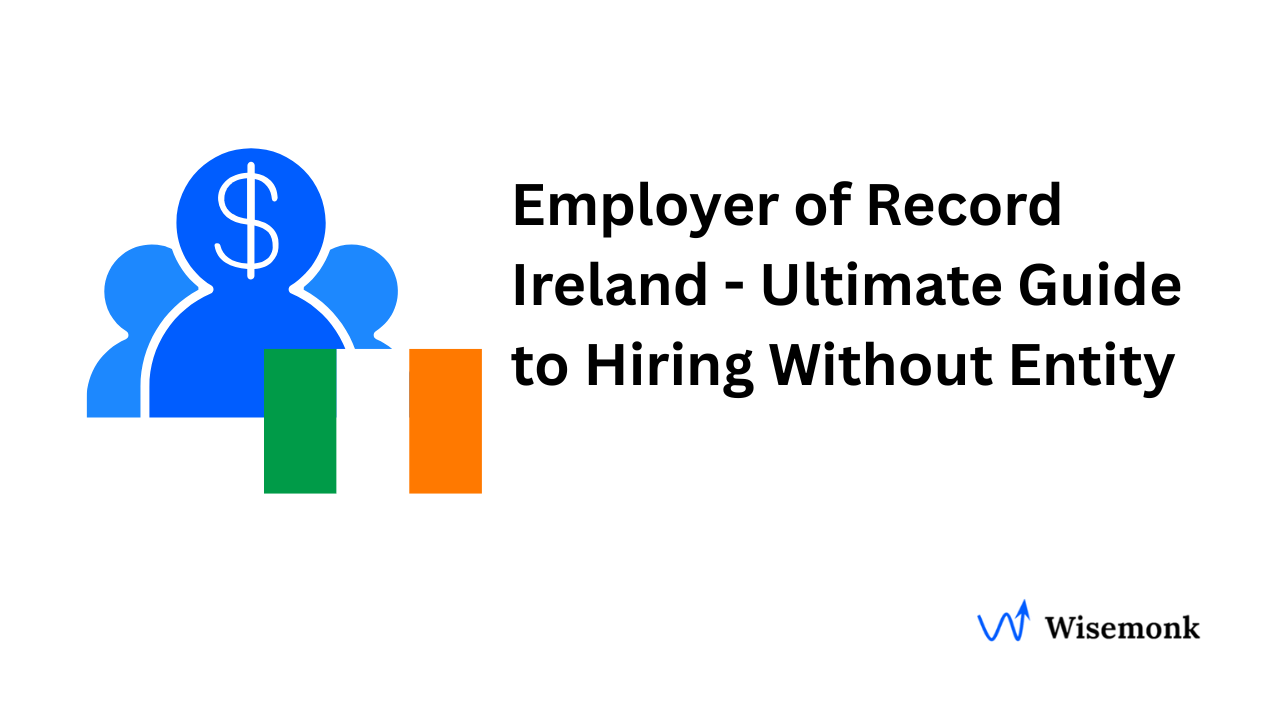
.png)
%20(1).webp)
